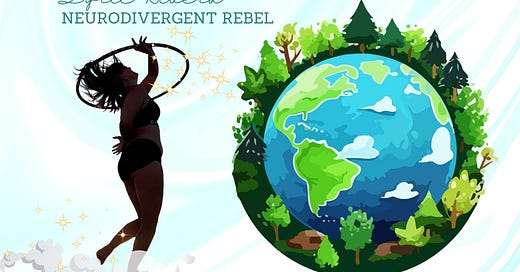Maxed Out - Burnout and NeuroDivergence: Why Many Autistic and Other NeuroDivergent People are Teetering on a Dangerous Edge
I function at maximum capacity because of society's expectations and what is needed for survival.
Welcome back to another Founding Member Friday!
Twice each month on Friday (sometimes on Thursdays), I put out an exclusive post like this one (often on a more intimate and personal topic OR featuring some of the training materials I’m teaching) that will be brought to you by and for our Founding Members.
The first part of this post is always FREE to everyone here on Substack, and the ending of the post is ONLY available to our Founding Members (as thanks for the extra support they give to make this blog possible).
We currently have fifteen Founding Members. I won’t put them on the spot today, but you know who you are. I can’t thank you enough for your support.
Autism is a neurodevelopmental difference historically defined (in a medical context) based only on deficits, focusing only on Autistic weaknesses and struggles.
While Autistic People often have weaknesses that non-autistic people don't, being Autistic influences so much more than our struggles (even though medical definitions of Autism continue to ignore this).
I didn't know I was Autistic for the first 29 years of my life, and not understanding my NeuroDivergent brain (and experiencing a lifetime of blame and shame without knowing why) was traumatic.
Learning I’m Autistic helped me to understand why I’d always felt so alien, why nothing I ever did was good enough for people, and why people often seemed to expect more (or less) from me than I was capable of giving.
My Autistic brain explained a lifetime of being over and underestimated by those around me. It also explained the repeated misunderstandings, regular miscommunications, lost people, and the friendships I'd been unable to maintain. It explained the pain, social confusion, coercion, manipulation, and all the times I could not detect when people with ulterior motives pretended to care about me or what I had to say.
Yes, Autism explains all of my weaknesses and much of my pain, but it is also more than that.
My Autistic brain influences most things in my life:
Who I socialize with
The types of relationships I have
How I process information
My experience of the world around me
My hobbies, passions, interests
Communication style and habits
Autism is interwoven into how I interpret and fit within social contexts, structures, and hierarchies.
In addition to my shortcomings, Autism also explains all of my strengths and is an essential part of who I am as a human being.
Autistic People are more than a checklist of weaknesses. Still, we are forced to think of ourselves primarily through the lens of deficits - taught to blame ourselves for failing to thrive in systems that ignore our needs (and blame us for failing when we never had the proper tools or support, to begin with).
Many of us are already functioning at maximum capacity because of society's expectations and what is needed for survival (in a world that is poorly suited for and often blames us for our needs).
I wouldn't know I was Autistic if it wasn't for Autistic Burnout.
I, like far too many Autistic and other NeuroDivergent People, have spent most of my life trapped in an endless cycle of Burnout (starting in elementary school).
The National Autistic Society defines Autistic burnout as a syndrome conceptualized as resulting from chronic life stress and a mismatch of expectations and abilities without adequate support. It is characterized by pervasive, long-term (typically 3+ months) exhaustion, loss of function, and reduced tolerance to stimulus.
When a child "burns out" and loses skills, we call it "regression." When it happens to an adult Autistic Person, we call it burnout.
Whenever I get burned out, I often also become very sick and malnourished because I struggle to care for myself, and food becomes unappetizing. This is further complicated by the co-occurring health conditions I have in addition to being Autistic (anxiety, IBS, migraines, seizures) - all of which seem to flare up when I'm not doing well.
Founding members have access to the rest of this post as a thanks for their support.
Sharing is caring!
Another way you can help support the work I do is by sharing this post (and it costs nothing but your time). It would mean the world to me.



